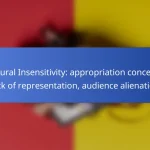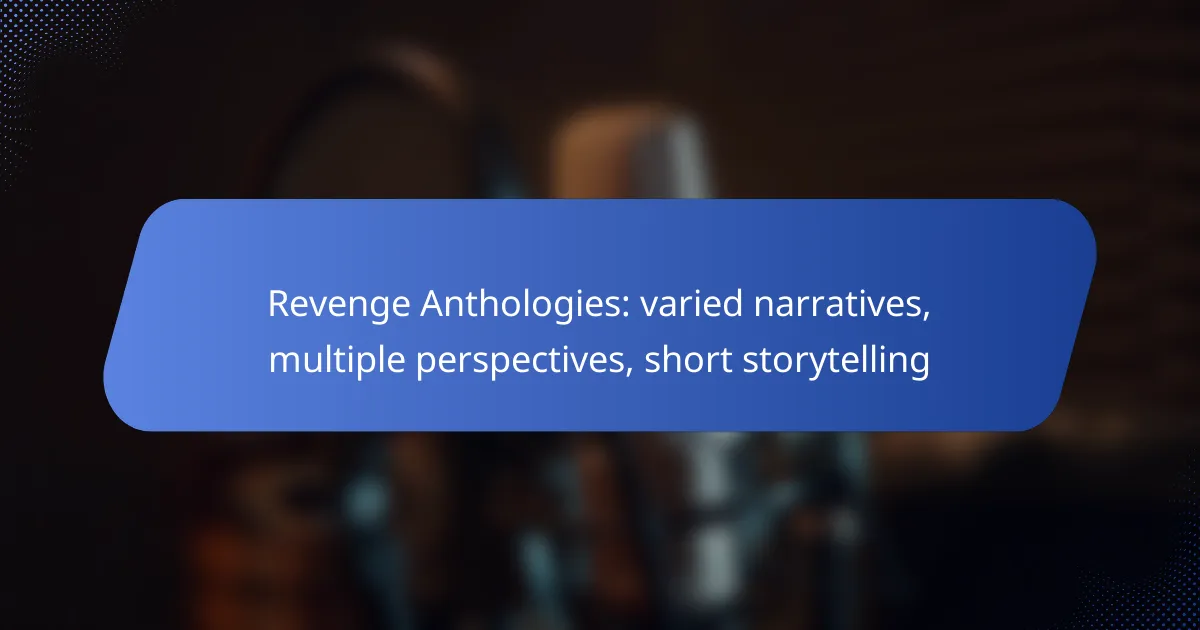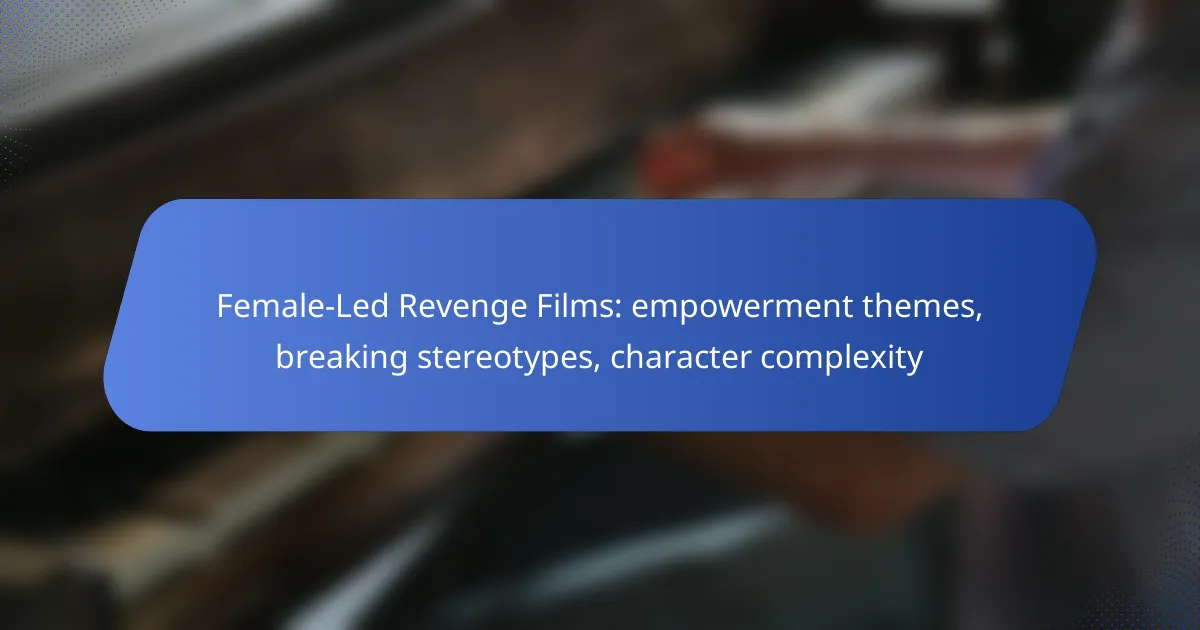Revenge documentaries delve into the intricate themes of vengeance, justice, and morality by examining real-life cases that provoke deep emotional responses. These films not only highlight the psychological and societal ramifications of revenge but also challenge viewers to reflect on the ethical dilemmas surrounding retribution and accountability.

What are the most notable revenge documentaries?
Revenge documentaries explore the complex themes of vengeance, justice, and morality through real-life cases. These films often delve into the psychological and societal implications of revenge, showcasing how individuals and communities respond to betrayal or harm.
Documentary one: “The Act of Killing”
“The Act of Killing” focuses on the Indonesian mass killings of 1965-66, where perpetrators reenact their crimes in various cinematic styles. This documentary challenges viewers to confront the nature of evil and the justifications for violence, raising moral questions about accountability and memory.
Through its unique approach, the film illustrates how the act of killing is not just a historical event but a lingering trauma that affects generations. It highlights the complexities of revenge and justice in a society that has largely ignored its past atrocities.
Documentary two: “The Imposter”
“The Imposter” tells the story of a French con artist who impersonates a missing Texas boy, raising questions about identity and deception. This documentary examines the lengths to which individuals will go to escape their realities and the impact of such actions on families and communities.
The film prompts viewers to consider the emotional ramifications of betrayal and the desire for closure. It showcases how revenge can manifest not only in direct actions but also in the psychological scars left on those involved.
Documentary three: “The Jinx”
“The Jinx” investigates the life of Robert Durst, a real estate heir linked to several murders. This documentary combines interviews, archival footage, and Durst’s own confessions, creating a gripping narrative that explores themes of guilt and retribution.
The series raises critical questions about justice and the power dynamics in cases of alleged wrongdoing. It illustrates how revenge can be intertwined with the pursuit of truth, leaving viewers to ponder the moral implications of seeking vengeance in a flawed legal system.
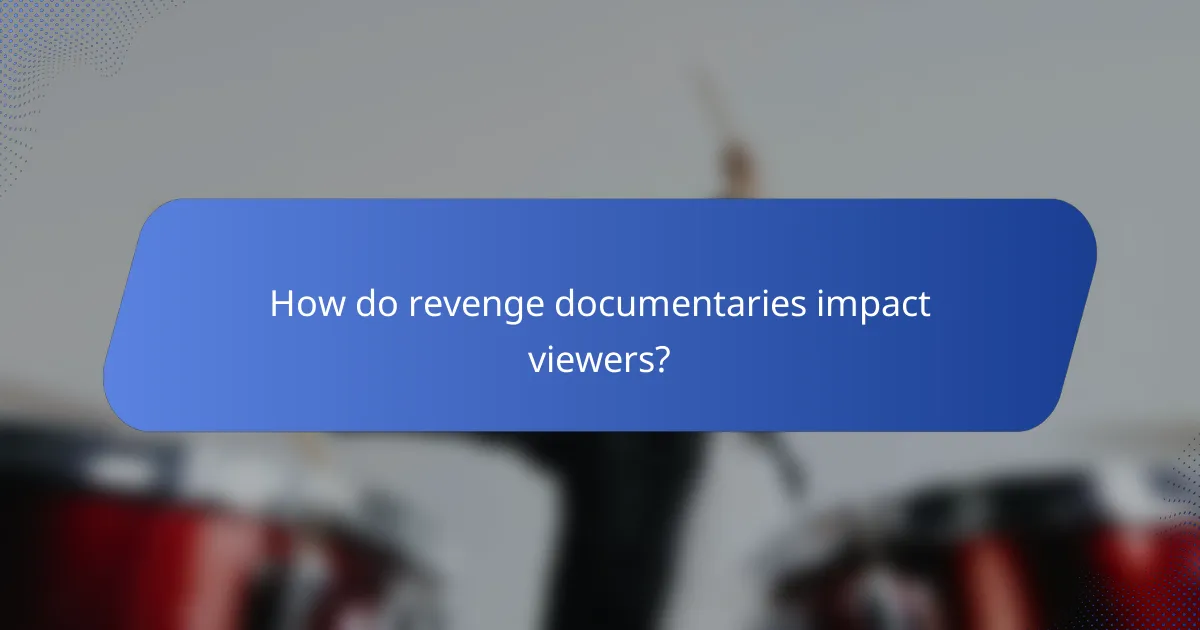
How do revenge documentaries impact viewers?
Revenge documentaries significantly impact viewers by evoking strong emotions and prompting critical reflections on morality and justice. These films often resonate deeply, influencing personal beliefs and societal attitudes toward retribution and accountability.
Emotional responses and psychological effects
Viewers of revenge documentaries frequently experience heightened emotional responses, including anger, empathy, and even vindication. These films can trigger intense feelings as audiences connect with the victims and their quests for justice, often leading to a cathartic experience.
Psychologically, such documentaries can reinforce existing beliefs about morality and justice. They may also provoke anxiety or discomfort, especially when the narratives challenge viewers’ ethical boundaries or provoke thoughts about real-life implications of revenge.
Influence on societal perceptions of justice
Revenge documentaries can shape societal perceptions of justice by framing narratives that glorify retribution. This portrayal can lead to a skewed understanding of justice, where viewers may start to believe that revenge is a legitimate response to wrongdoing.
Moreover, these films can spark discussions about the effectiveness of legal systems and the morality of taking justice into one’s own hands. As audiences engage with these narratives, they may advocate for changes in laws or societal norms regarding punishment and forgiveness.
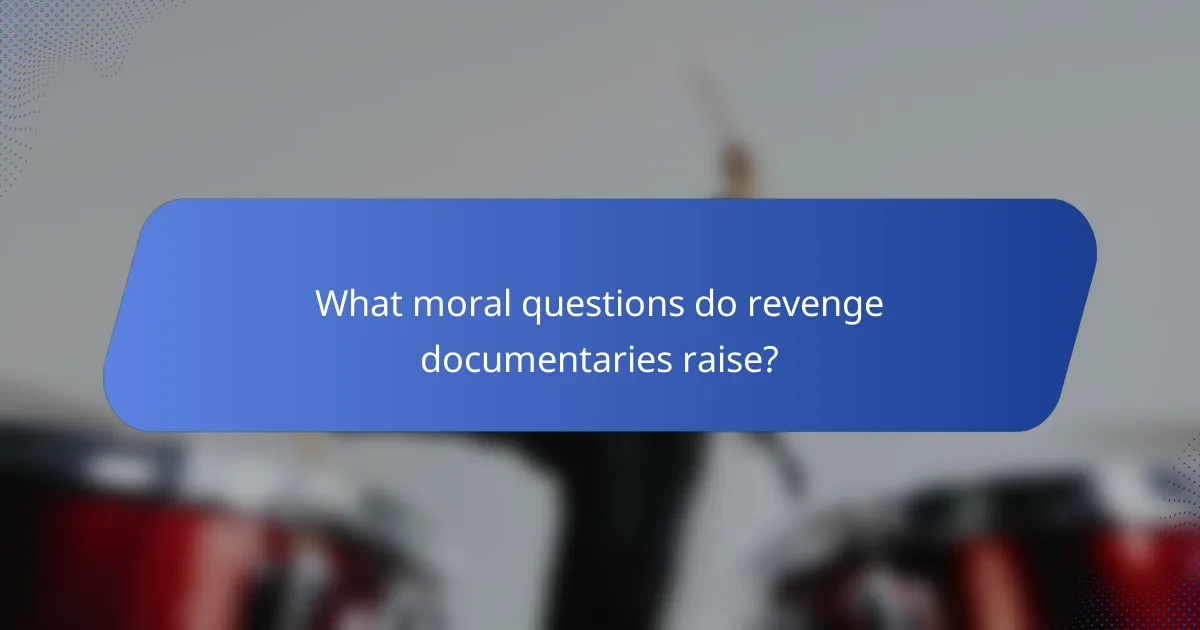
What moral questions do revenge documentaries raise?
Revenge documentaries often explore complex moral dilemmas surrounding justice, ethics, and the human psyche. They challenge viewers to consider whether revenge can ever be justified and what the implications of such actions might be for individuals and society.
Is revenge justified?
The justification of revenge is a contentious issue. Some argue that it serves as a form of justice, providing closure to victims or their families. Others contend that revenge perpetuates a cycle of violence and does not address the root causes of conflict.
In many cultures, revenge is seen as a personal right, yet it often raises ethical concerns. For instance, in legal systems, taking matters into one’s own hands can lead to severe consequences, including criminal charges. Understanding the cultural context is crucial when evaluating the justification of revenge.
Consequences of seeking revenge
Seeking revenge can lead to a range of negative outcomes, both personally and socially. Individuals may experience guilt, regret, or emotional turmoil after acting on vengeful impulses. Additionally, revenge can escalate conflicts, resulting in further harm to all parties involved.
On a societal level, revenge can undermine trust and community cohesion. For example, cycles of retaliation can emerge in feuds, leading to prolonged disputes that affect families and neighborhoods. It is essential to weigh these potential consequences against the desire for retribution.
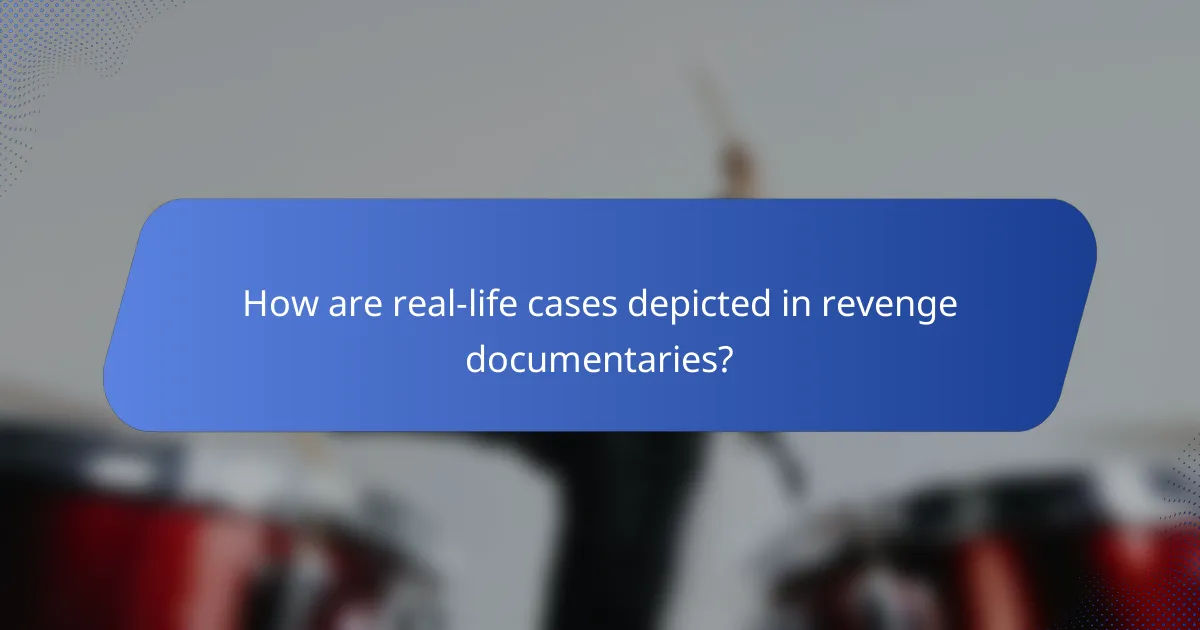
How are real-life cases depicted in revenge documentaries?
Revenge documentaries often portray real-life cases by focusing on the motivations and consequences of revenge-driven actions. These films typically explore the psychological, social, and legal ramifications, providing viewers with a nuanced understanding of the events and the individuals involved.
Case study: “Capturing the Friedmans”
“Capturing the Friedmans” examines the case of a family accused of child molestation in the 1980s. The documentary presents a complex narrative that questions the validity of the accusations and the impact of media sensationalism on public perception.
Through interviews and home videos, the film highlights the emotional turmoil experienced by the family members, illustrating how revenge can manifest in various forms, including public shaming and personal vendettas. The ambiguity surrounding the truth raises moral questions about justice and accountability.
Case study: “Making a Murderer”
“Making a Murderer” follows the story of Steven Avery, who was wrongfully convicted of a crime and later accused of another murder. The documentary provides an in-depth look at the legal system and the potential for revenge against those who wronged Avery.
This case illustrates how the pursuit of revenge can lead to systemic failures, as the documentary critiques law enforcement practices and the judicial process. It encourages viewers to consider the implications of revenge not just on individuals, but on society as a whole, highlighting the importance of fairness and due process.

What are the common themes in revenge documentaries?
Revenge documentaries often explore themes of justice, morality, and the human psyche. They delve into the motivations behind revenge, the consequences of such actions, and the blurred lines between seeking justice and pursuing vengeance.
Justice vs. vengeance
The distinction between justice and vengeance is a central theme in many revenge documentaries. Justice typically involves a fair and legal response to wrongdoing, while vengeance is often driven by personal emotion and desire for retribution. This difference raises moral questions about the legitimacy of taking matters into one’s own hands.
For instance, documentaries may depict cases where individuals feel failed by the justice system, leading them to seek revenge. This can create a cycle of violence, as the initial act of revenge may provoke further retaliation, complicating the notion of justice.
Identity and transformation
Revenge can significantly alter an individual’s identity and sense of self. Documentaries often showcase how the pursuit of revenge can consume a person, leading to profound changes in their behavior and outlook on life. This transformation can be both empowering and destructive.
For example, a victim who becomes a perpetrator of revenge may grapple with feelings of guilt and remorse, questioning their moral compass. This internal conflict highlights the psychological toll that revenge can take, prompting viewers to reflect on the broader implications for personal identity and societal norms.
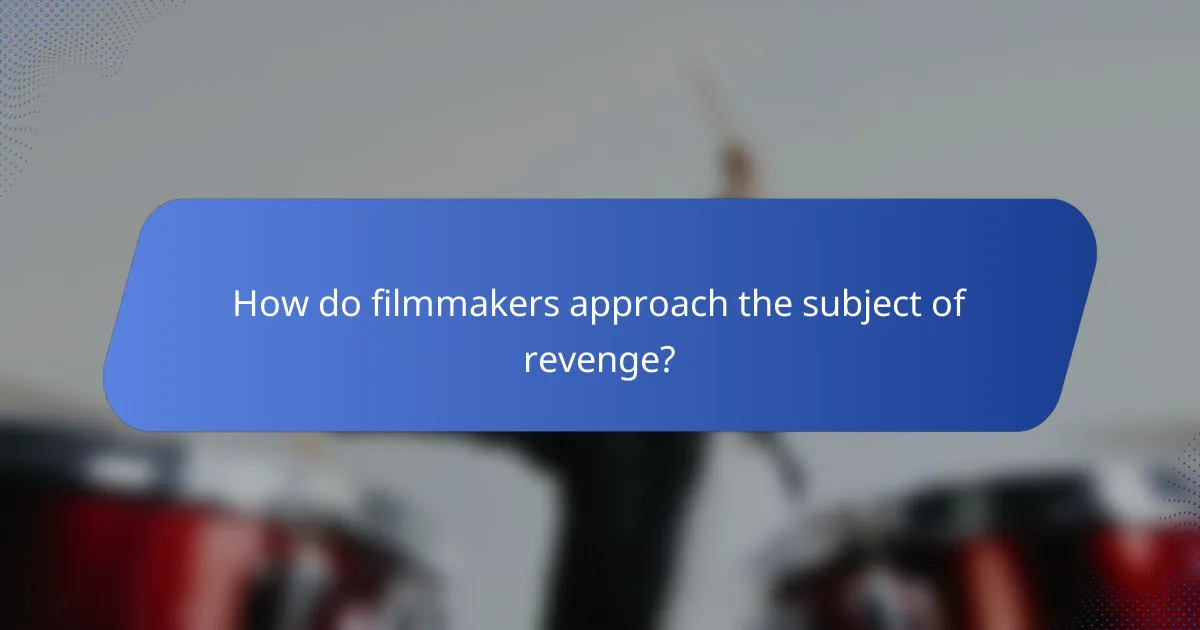
How do filmmakers approach the subject of revenge?
Filmmakers often explore revenge by delving into the psychological motivations behind it and the consequences that follow. They aim to present a nuanced view that balances the allure of vengeance with its moral implications, often prompting viewers to reflect on their own beliefs about justice and retribution.
Ethical considerations in storytelling
When addressing revenge, filmmakers must navigate complex ethical dilemmas. They should consider the impact of their narratives on audiences, particularly regarding the glorification of violence or the trivialization of trauma. A responsible approach involves portraying the emotional and psychological fallout of revenge, rather than simply celebrating it.
Filmmakers can also engage with real-life cases of revenge, ensuring they handle sensitive topics with care. This includes obtaining consent from those involved and respecting the dignity of victims and their families. Ethical storytelling fosters a deeper understanding of the consequences of revenge, encouraging viewers to think critically about the subject.
Techniques for engaging the audience
To effectively engage audiences, filmmakers often use a mix of narrative techniques and visual storytelling. Flashbacks can provide context for a character’s motivations, while suspenseful pacing keeps viewers invested in the unfolding drama. Creating relatable characters who grapple with moral dilemmas can also enhance emotional engagement.
Additionally, filmmakers might employ symbolism and thematic elements to reinforce the complexities of revenge. For instance, contrasting imagery of peace and chaos can underscore the internal conflict faced by characters. By blending these techniques, filmmakers can craft compelling stories that resonate with viewers and provoke thoughtful discussions about the nature of revenge.




